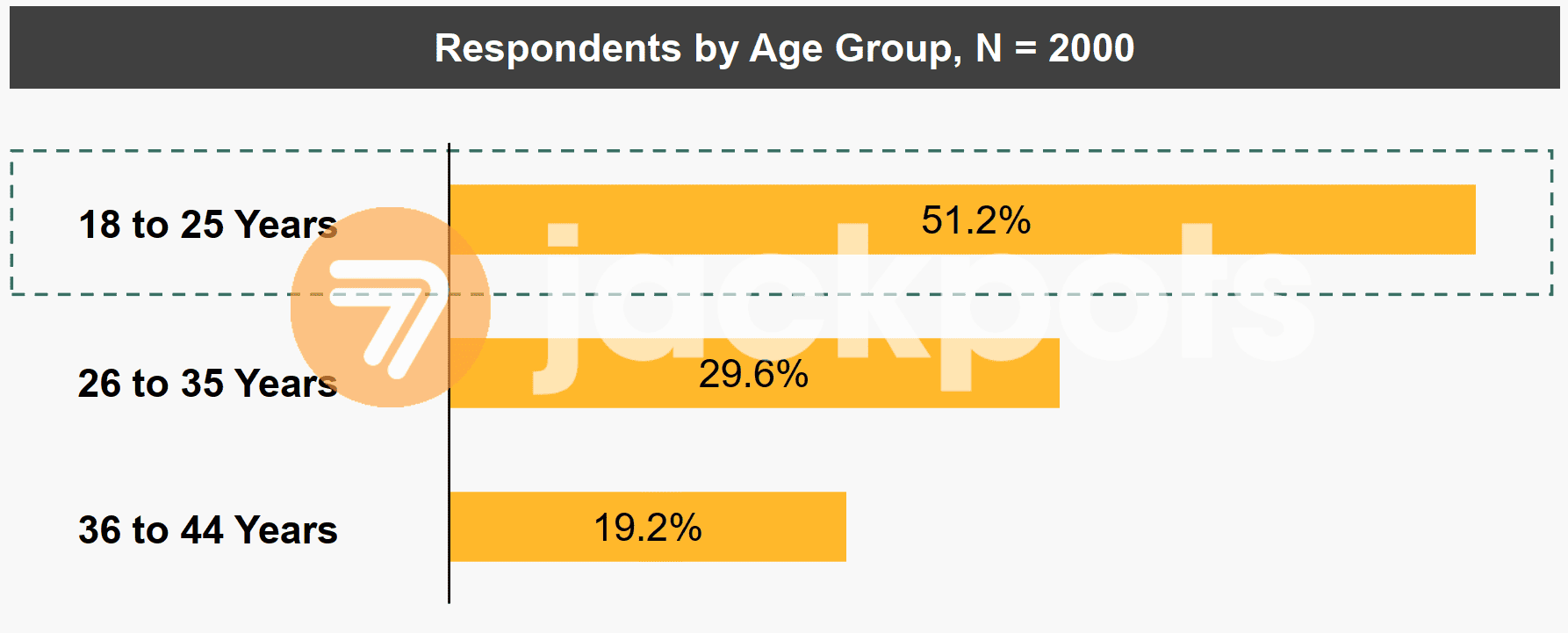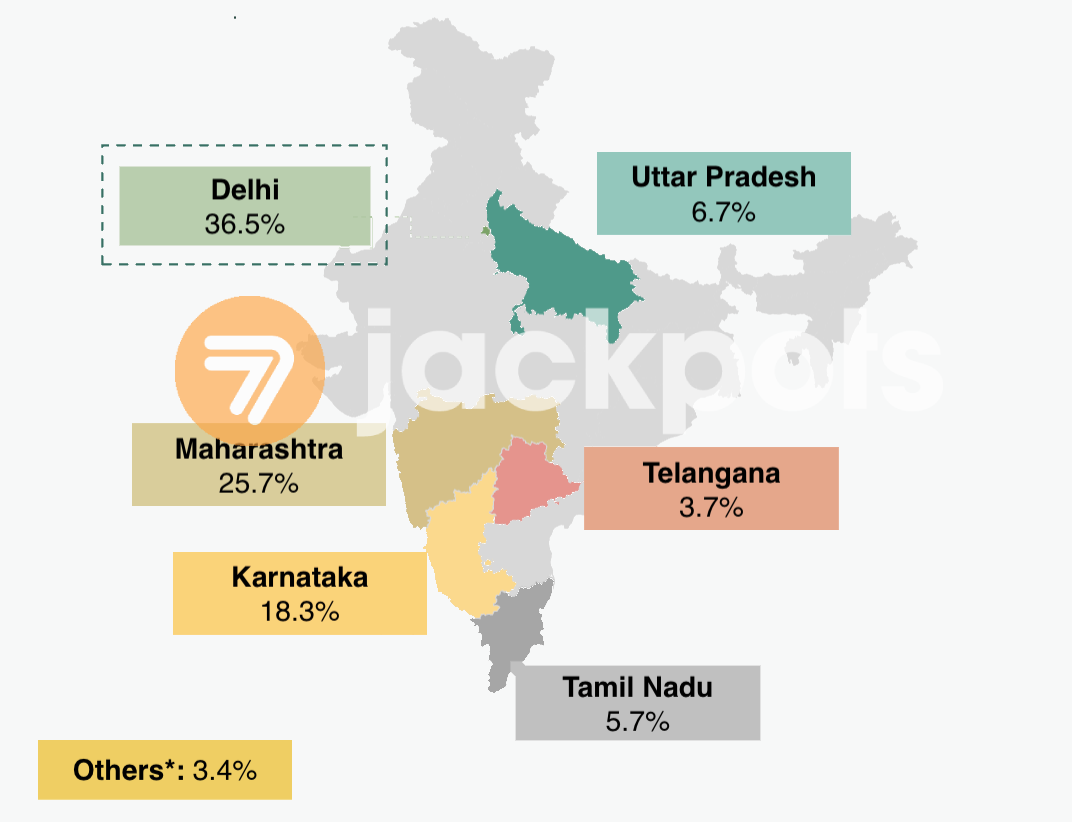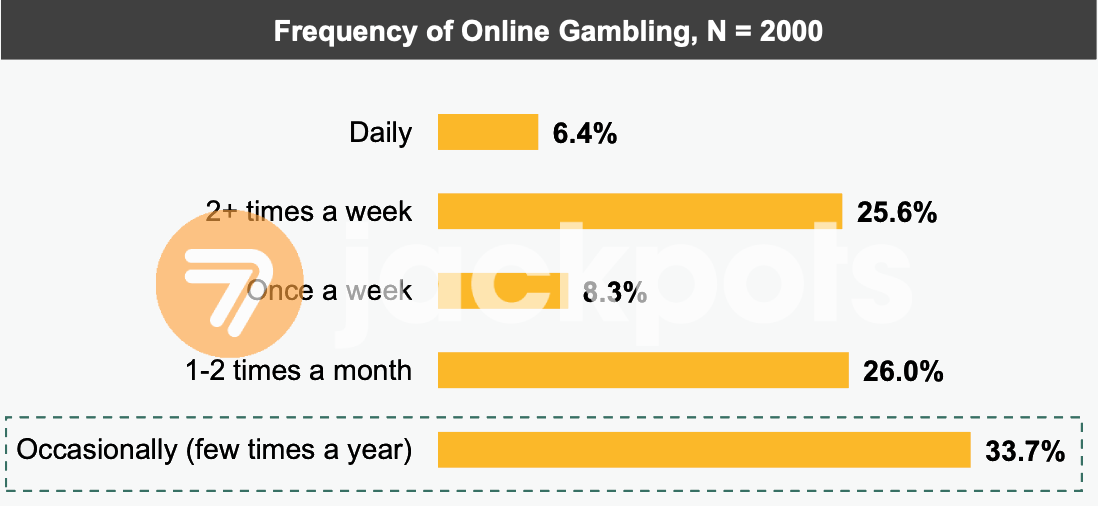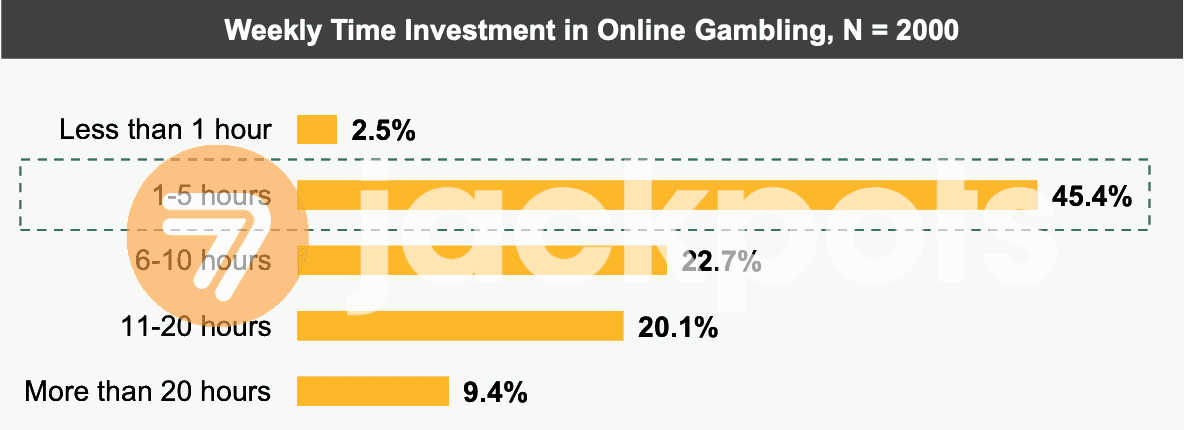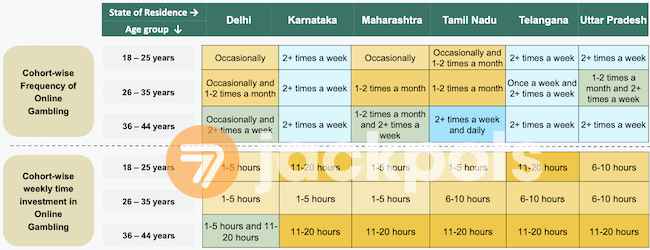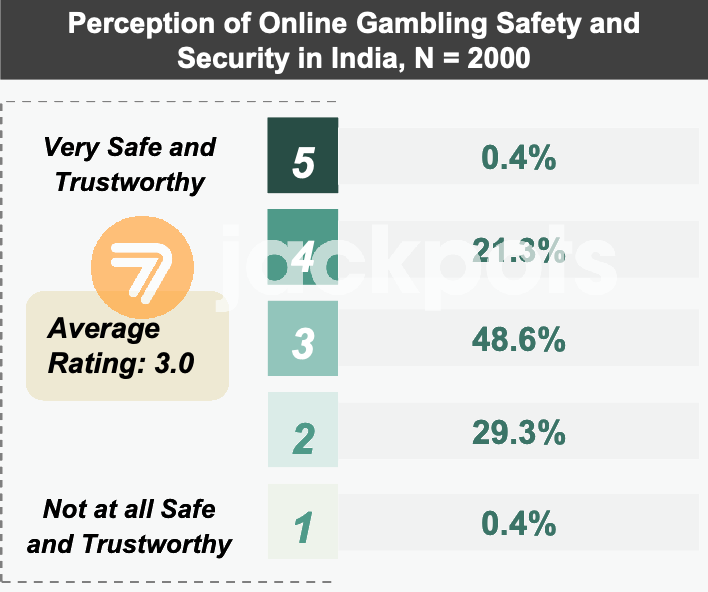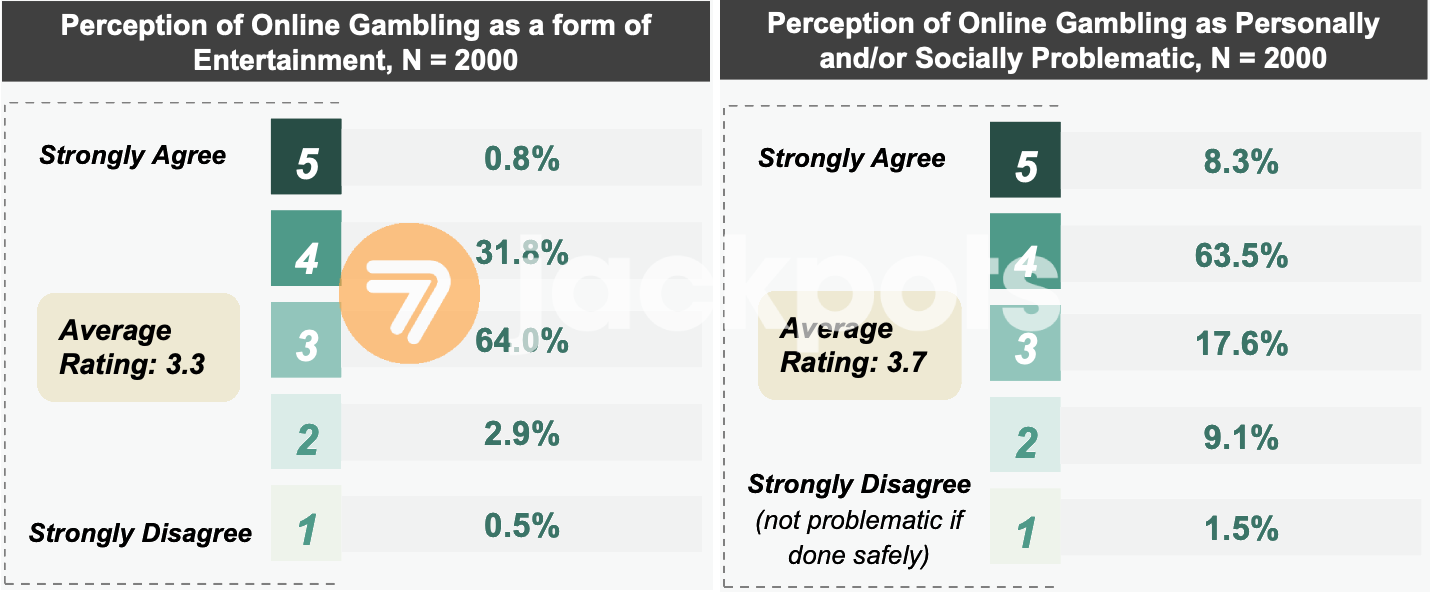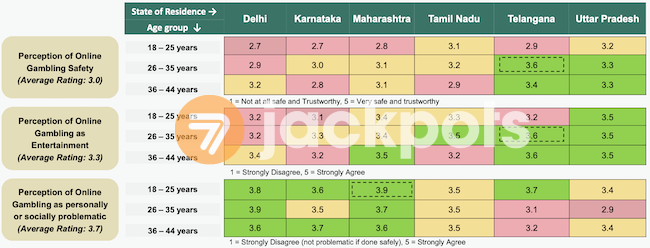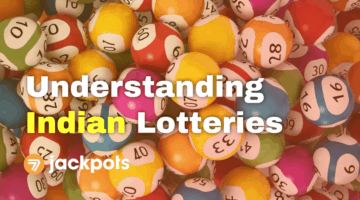How We Created This Research Paper on Consumer Behaviour
This study uses data from survey research conducted by Ken Research, a leading research firm in India. Data on consumer behaviour was collected through an online survey distributed among adult participants from several Indian states (Delhi, Uttar Pradesh, Maharashtra, Karnataka, Tamil Nadu, Telangana, Gujarat, Rajasthan, Madhya Pradesh, Haryana, Assam). The data points were systematically collected and analysed exclusively for this study.
The data collected includes:
- Gender
- Age
- State of residence
- Frequency of gambling
- Weekly time invested in gambling
- Familiarity with Indian gambling laws
- Factors influencing their gambling decisions
- Perceptions of online gambling
Respondents by Gender and State
Preliminary data indicates that the gamblers surveyed in this study are predominantly male (73.4%). Within the age group of 18 to 25 years (51.2%), and based in Delhi (36.5%).
Having almost two-thirds of the respondents male isn’t too surprising. India’s historical and cultural influences often frame gambling as a male-dominated activity. And equality between men and women in areas that would make gambling more accessible to women (salaries, family duties, material ownership, etc.) is still imbalanced in India as it is in most countries.
Men are also risk-takers on a larger scale than women, which could be an additional explanation for the dominance of men in gambling.
While the largest group of respondents are young, the remaining 48.8% stretches from 26 to 44. With the larger section (29.6%) being 26-35 and the smallest section (19.2%) comprising of the remaining 36-44-year-olds.
Looking at the geographical distribution among the respondents, Delhi holds the highest number (36.5%), followed by Maharashtra (25.7%) and Karnataka (18.3%). One plausible explanation could be these states’ technological advancements, connectivity, and economic conditions, which can facilitate access to online gambling platforms.
Uttar Pradesh (6.7%), Tamil Nadu (5.4%), and Telangana (3.7%) follow, with a number of other states (Gujarat, Rajasthan, Madhya Pradesh, Haryana, and Assam) making up the remaining 3.4%.
Gambling Frequency and Weekly Time Investment
When exploring how often Indian players engage in online gambling, results are quite mixed. While 33.7% of players state that they only play a few times a year, most players (40.3%) play weekly. 32% of those weekly gamblers play two times or more a week (25.6%), while 6.4% engage in gambling daily.
The remaining 26% estimate their gambling only to occur 1-2 times a month. This split between regular and rare gamblers shows a clear distinction between player behaviour. And could also result from the types of games players engage in.
While online casino games are constantly available, sports betting ebbs and flows with tournaments, events, and leagues, resulting in a much more scattered player behaviour among players who mainly focus on a few sporting events a year.
That said, two-thirds of the respondents are gambling regularly, whether weekly or monthly. Proving further that gambling is an accepted form of recreational activity in India, at least among its residents.
If we take an even closer look at the time players invest in gambling. 47.9% of the respondents report spending no more than a maximum of five hours per week gambling. This indicates that gambling among almost half of the responding players is mainly seen as a pastime activity. And that players allocate their time with care, prioritising other responsibilities or forms of leisure.
However, the majority, 52%, report playing more than six hours a week, with 20% stating spending 11-20 hours a week on this activity. While these numbers are high, it is important to remember that the average person in India spends over 4 hours a day on their smartphone, up to 28 hours per week.
Consumer Behaviour: Age Directly Affects Time Invested in Gambling
If we place the time invested in gambling into the context of age groups, we get even more information on player behaviour that can be used to conclude which type of players play the most.
It becomes clear that, although a higher number of young people play overall, older players invest more time into their gambling, with 36-44-year-olds reported to spend 11+ hours gambling in almost all states except for Delhi, where results were blended; possibly a result of a higher density of employed people simply not having the time to play for extended periods.
While all respondents in Karnataka play several times a week, gaming session length and overall gambling frequency differ when we look at the different age groups across the states.
Not only do older players play more regularly, but they also spend more time doing so. Especially the hours spent gambling could be explained by older generations spending less time on social media and other forms of mobile online entertainment, instead focusing their time on a single activity, like gambling. Younger generations instead split their online habits across numerous activities such as games, social media, education, communication, and other types of entertainment like streams, movies, or series.
Financial privilege can also be an important factor in why older players gamble more. With a longer career or higher earnings, an older age group has more financial stability to gamble and can do so for longer periods without significantly affecting their economy.
Winning Probability Takes Lead as Main Influence for Gambling
Looking at the why of Indian players, it becomes clear that the allure of potential large winnings or jackpots drives the motivation to gamble, with 61.6% of all respondents marking this as an influencer of their gambling behaviours.
Winning big has always been one of the largest motivators for why people take to gambling, and it’s often the moment a “life-changing” win happens that is captured and placed on advertisements for casinos, sports betting, and even lotteries.
The second-biggest influence on the responder’s gambling behaviour is legality and regulation, where 47% listed this as an important factor. This goes hand-in-hand with 99.6% of all respondents at least being aware of the current legal landscape related to gambling in India, where 50% stated to be “somewhat familiar.” 38.2% are even more comfortable with their understanding of Indian gambling law.
However, it does become evident that, although almost half of the respondents state that legality is an important factor in making choices related to gambling, it is still an aspect that is disregarded in reality. Both Karnataka and Telangana, two states in which online gambling is illegal, hold the most frequent players; they are also the only two states where both young and old players spend a significantly longer time gambling on a weekly basis.
The availability of gambling (31.6%) also played a part in players’ choices, as did budget (17.9%), game quality (17.7%), advertisement (15.6%), and the thrill and excitement of gambling (10.2%).
Sports Betting Leads the Way Among Indian Gamblers
India is a unique market due to its relation to gambling. Not only does betting have an extensive history in the country, but board games and card games are common forms of entertainment between families and friends, especially during holidays like Diwali or Janmashtami.
These traditions are confirmed further in our survey, as 64.7% of the respondents state to be engaged in sports betting, with card games (42.4%) like Poker, Rummy, and Baccarat, and board games (40.1%) like Ludo, Carrom, and Chess following suite.
Only 30.3% state to be engaged in casino games like table games, game shows, crash games, or slots, further proving that the “casino” aspect of gambling is still very much in its infancy in India.
Interestingly, only 8.9% of players state to engage in the lottery frequently. With a lottery market valued at ₹50,000 crore annually, this is surprising. Still, it’s also important to remember that the behaviour of lottery players differs from that of casino gamblers. Or sports punters due to the frequency of lottery draws.
Overall Perception of Gambling is Mixed
According to our survey data, online gambling is seen as a form of entertainment but one that isn’t free from risk or dangers. It’s also evident that players understand the naturally occurring risks of gambling. And are aware of additional risks related to fraud and gambling problems.
Responses to whether gambling is safe, if it’s a good form of entertainment. And if gambling is problematic landed mainly straight down the middle across the board. Homogenous results like these suggest that players have an overall lax relationship with gambling.
Leveled Perception of Online Gambling Safety, Despite Cases of Fraud
Safety and security are among the biggest issues of online gambling in India. And most players lean toward a slight distrust of online gambling sites.
And this distrust isn’t unmotivated. Although off-shore operators offer licensed casino products with legitimate payment methods, many desi players resort to locally run online casinos. Often operated by private persons, which lack security measures or proof of genuine, fair games being offered.
Just over one-quarter of the respondents (25.8%) reported having experienced fraud while gambling online. This is in line with the percentage of people in India to fall victim to identity theft in 2022 (27.2%).
The risks from online gambling range from fraudulent practices like scams or identity theft to other problems. Such as unauthorised transactions or withdrawal difficulties. These findings make the need for regulation clear. As putting pressure on robust cybersecurity measures and transparent business practices in the online gambling industry. To ensure consumer protection and trust can only be maintained when there’s a legal framework and financial resources to do so.
Online Gambling Seen as a Mix of Entertainment and Risk
The majority of respondents report that they believe gambling to be a form of entertainment but that it isn’t risk-free. 64% of players believe that gambling can be fun and thrilling. But that there’s also potential risk involved, both monetarily and mentally.
The understanding of risk becomes even more evident when looking at the perception of gambling being problematic. 63.5% of respondents agree that gambling is personally and/or socially problematic. This awareness shows a healthy level of knowledge around gambling. And also falls in line with data showing players being more likely to play socially responsible games.
Another clear trend shown is that players in Telangana have a more positive view of gambling in general. Believing that it is fairly safe a form of entertainment. And a form that poses some risk while not being outright dangerous. This is a curious finding, considering Telangana is one of India’s strictest states when it comes to gambling. Not differentiating between games of skill or chance, and where the only form of legal gambling is betting on the local horse races.
Online Gambling is Here to Stay, Indian Consumer Behaviour Confirms
By analysing the multi-dimensional aspects of consumer behaviour among online gamblers in India. Such as gender, state, groups, and preferences, we are able to capture a dynamic nature among them.
Things like personal motivation, legal frameworks, cultural context, risk, and reward all play a part in how people perceive and participate in online gambling in the country.
Indian players have embraced gambling online as an accepted form of entertainment. And it is balanced with other hobbies, work, and social life. Older players tend to spend more time and frequency gambling, while the younger generations are not only playing less. But are also more weary about the risks and consequences associated with the activity of real money gambling.
Gambling is not only prevalent in states where gambling is illegal. It is thriving, further proving that bans aren’t producing the desired effect. And that regulation could be a healthier approach to the emerging online gambling and betting industry. Regulation would be able to bring all aspects that players currently miss. Such as player protection, licensing requirements, and responsible gambling measures.

